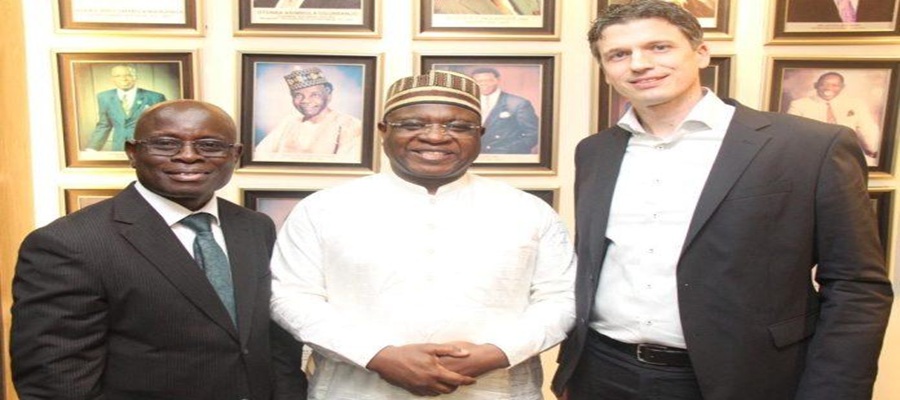News
New Horizons Transforms Lives through IT Training
The greatest challenge facing the Nigerian youth today is lack of skills required by the industries. Such a syndrome is often termed as unemployability.
Year after year, thousands of youths graduate out of higher institutions into the labour market, majority of who go without jobs for months and even for years. When some of them are lucky to secure one, it is for menial jobs, hence leading to under-employment.
Dr.(Mrs.) Oby Ezekwelisi, one of the nation’s former ministers for education said on October 28, 2006 during the session on education reform that 70 percent of the Nigerian youths are either unemployed, underemployed or unemployable and between 2000-2009 the country would have succeeded in training 10 million highly skilled criminals if nothing is done. We can surmise that the "Holy Grail called Employment" is elusive to the Nigerian youth and clearly spells doom for the country.
It is this anomaly that New Horizons, the foremost IT Training institution in the world set as a challenge for itself to reduce and even remove.
To achieve this, New Horizons organized a job fair at the National Stadium which was attended by well over 10,000 people from all parts of the country. The purpose of the fair was to provide individuals with critical information from renowned industry experts on how to become employable thereby living a successful and productive professional life. Participants were surprised at the simple tasks they required to transform their lives.
Presentations at the event were given by resource persons from reputable IT companies such as Microsoft, Cisco, Oracle, EC-Council unveiling to listeners the limitless opportunities abound in the IT industry and the right steps to take in acquiring the required skills to claim these opportunities. Participants also were availed the opportunity of meeting with representatives of renowned consulting firms from Michael Stevens and IRIS Consulting, as they were taught the necessary techniques involved in the writing of resumes, and the art of scaling through employment tests and interviews organized by organizations or their agencies.
At the end of the event, over 6,000 people had registered to upgrade their skills in fields such as e-business-Project Management, Customer Relationship Management, Supply Chain Management; IT Security; Cisco-CCNA, CCNP, CCSP, CCVP; Oracle-OCA, OCP; Microsoft-MCSA, MCSD, MCSE.
Although the event was concluded some weeks back, the effects have continued to linger as individuals that benefited from the event have been coming forward with testimonies of how the event has impacted on their lives.
Due to the opportunity offered participants by the platform, some of them had interactions with the consulting firms and as a result many were called for tests and interviews as they had learnt how to better package themselves. The good news is that some of them got jobs. An example is Ms. Lovely Ellufere, who said the job fair changed her life for the better. A great majority also have since focused their energies on acquiring industry relevant skills to enhance their opportunities in the labour market.
News
ICPC Charges Ozekhome with Forgery, Corruption Over London Property

Independent Corrupt Practices and Other Related Offences Commission (ICPC) has filed a criminal charge against Chief Mike Ozekhome, SAN, alleging his involvement in a corruption scheme connected to a London property.

Chief Ozekhome
The ICPC filed a three-count charge before the Abuja High Court through its Head of High Profile Prosecution Department, Osuobeni Akponimisingha. The charge, marked FCT/HC/CR/010/26 and dated 16 January, names Ozekhome as the sole defendant in the case.
In the first count, the commission alleged that Ozekhome, aged 68 and residing at No. 53 Nile Street, Maitama, Abuja, received a property described as House 79, Randall Avenue, London NW2 7SX, around August 2021. The ICPC stated that the property was purportedly given to him by one Mr. Shani Tali and that the act amounted to a felony contrary to Section 13 and punishable under Section 24 of the Corrupt Practices and Other Related Offences Act 2000.
In the second count, the senior lawyer was accused of making a false document with a Nigerian passport bearing the name “Mr. Shani Tali” around the same period. The commission alleged that the passport, marked A07535463, was intended to support a fraudulent claim of ownership of the London property. The alleged offence contravenes Section 363 and is punishable under Section 364 of the Penal Code CAP 532 Laws of the Federal Capital Territory (FCT), Abuja, 2006.
The third count alleged that Ozekhome dishonestly used the same passport to support claims over the property despite allegedly knowing the document was false, an offence said to violate Section 366 and punishable under Section 364 of the Penal Code.
Supporting documents attached to the charge include an extra-judicial statement allegedly made by the defendant on 12 January 2026, a judgment referenced as REF/2023/0155 dated 11 September 2025, interim forfeiture proceedings relating to the London house, a data page for “Shani Tali,” a letter dated 18 December 2025, and other expected materials.
The ICPC also listed several individuals expected to testify, including investigators Wakili Musa and Tosin Olayiwola, a representative of the Nigerian Immigration Service, and investigators Ebenezer Nduo and Blessing Monokpo, alongside any additional witnesses the commission may call. As of the time of reporting, the case had not yet been assigned to a judge.
The development follows an earlier investigation by the ICPC sparked by a petition from Olanrewaju Suraj, head of the Human and Environmental Development Agenda (HEDA), citing a judgment from a London property tribunal.
The tribunal’s ruling had linked Ozekhome and others to alleged forgery and fraudulent claims of ownership of the North London building. The petition accused several individuals of conspiring with corrupt Nigerian officials to procure forged identity documents for the purpose of “fraudulently claim[ing] ownership” of the property.
News
NGX Unveils Net-Zero Plan for Greener Capital Market

Nigerian Exchange Limited (NGX) has launched the NGX Net-Zero Programme to guide listed companies toward clear carbon reduction pathways and enhanced climate disclosures aligned with global investor standards.

NGX
The high-level launch engaged chief executives of quoted firms alongside development partners including German Investment Corporation KfW, DEG, and African Foresight Group (AFG), NGX’s implementation partner. Issuers and investors discussed financing decarbonisation, sustainability practices, and attracting climate-aligned capital.
NGX Group Chairman Dr Umaru Kwairanga described the initiative as concrete climate action, commending partners for two years of groundwork. “Today marks leadership and decisive action. Climate change has become a core business imperative, with capital markets mobilising capital and setting standards,” Kwairanga said.
He positioned NGX Net-Zero to support emissions measurement, disclosure, capacity building, and sustainable finance access, urging CEOs to embrace it strategically rather than as compliance. Kwairanga reaffirmed NGX’s goal to make Nigeria’s capital market Africa’s green finance hub.
Group CEO Temi Popoola called climate action a business imperative, noting sustainability-embedded firms attract capital, manage risks, and stay competitive. DEG Management Board Member Monika Beck highlighted partnerships scaling impactful, commercially viable climate solutions.
The event closed with a ceremonial gong marking the programme launch and send-off for outgoing DEG Regional Director Bernd Telemann.
News
Nigeria Off EU High-Risk Money Laundering List in Major Financial Win

Nigerian Financial Intelligence Unit (NFIU) has hailed Nigeria’s removal from the European Union’s list of high-risk third countries for Anti-Money Laundering and Countering the Financing of Terrorism (AML/CFT) as a landmark achievement endorsing the nation’s reform efforts.

Nigerian Financial Intelligence Unit (NFIU)
NFIU CEO Hafsat Abubakar Bakari said the delisting, contained in European Commission Delegated Regulation (EU) C (2025) 8460 adopted December 4, 2025 and effective January 29, 2026, affirms sustained AML/CFT and Counter Proliferation Financing (CPF) reforms.
The move follows Nigeria’s exit from the FATF Jurisdictions under Increased Monitoring after addressing strategic deficiencies, alongside Burkina Faso, Mali, Mozambique, South Africa and Tanzania.
Bakari noted the European Commission recognised Nigeria’s strengthened AML/CFT effectiveness, closed technical gaps, and fulfilled FATF Action Plan commitments leading to grey list removal in June and October 2025.
The delisting eliminates enhanced due diligence requirements for EU financial transactions, easing compliance, boosting cross-border flows, and enhancing Nigeria’s appeal for European trade, investment and partnerships.
The NFIU attributed success to President Bola Ahmed Tinubu’s political will and collaboration among National Assembly, law enforcement, regulators, judiciary, private sector and development partners.
The agency reaffirmed commitment to ongoing FATF, GIABA, EU engagement and domestic framework resilience to maintain international confidence in Nigeria’s financial system.

 E-Financial3 days ago
E-Financial3 days agoSEC Hikes Minimum Capital Requirements for Market Operators After a Decade

 Telecom3 days ago
Telecom3 days agoStudy Shows Blocks in Telegram are Pushing the Underground Out

 News3 days ago
News3 days agoNigeria Off EU High-Risk Money Laundering List in Major Financial Win

 News3 days ago
News3 days agoNGX Unveils Net-Zero Plan for Greener Capital Market

 Telecom3 days ago
Telecom3 days agoGalaxy Backbone Marks Two Decades of Powering Nigeria’s Digital Evolution

 Telecom3 days ago
Telecom3 days agoVodacom Crowned Africa’s Top Employer 3rd Year Running on Innovation, Ethical AI

 Telecom3 days ago
Telecom3 days agoGalaxy Backbone Marks 20 Years, Tops FG Website Scorecard

 E-Financial16 hours ago
E-Financial16 hours agoHere Are Nigerian Banks That Have Secured Their Licences















